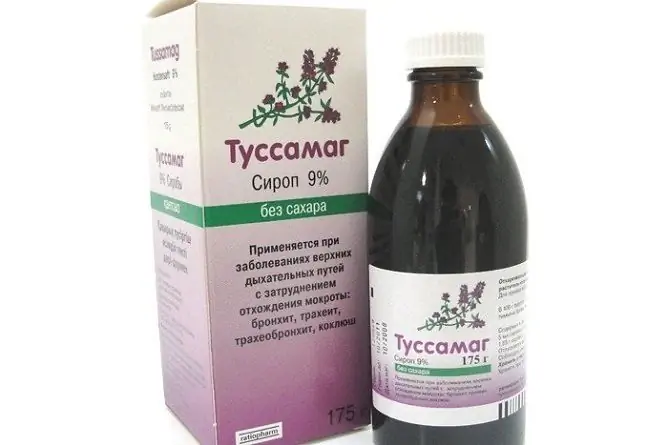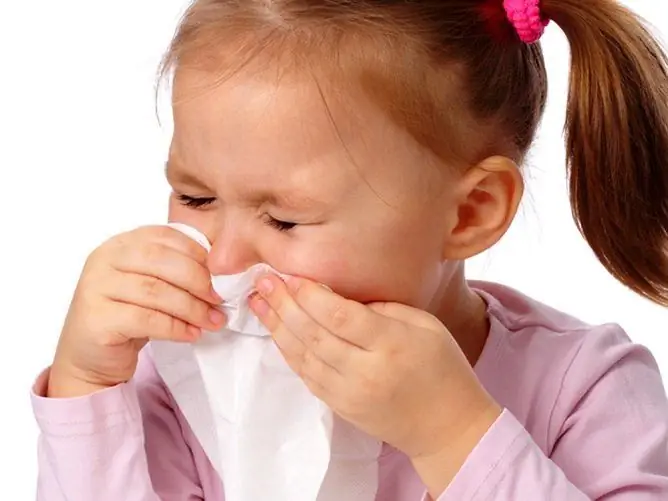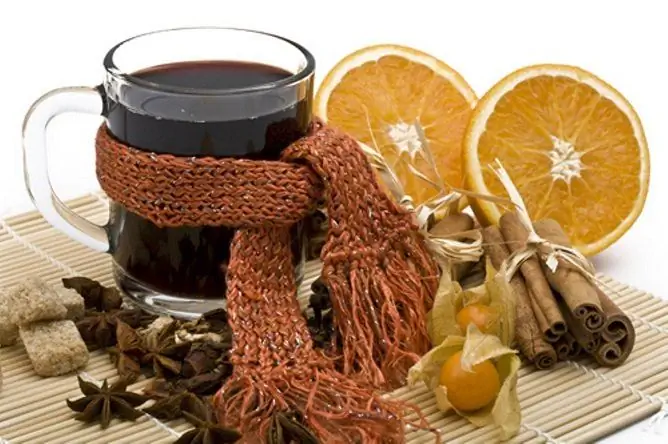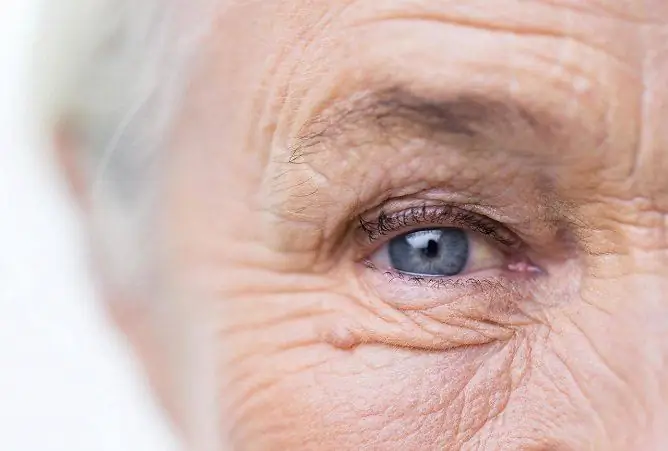- Author Rachel Wainwright wainwright@abchealthonline.com.
- Public 2023-12-15 07:39.
- Last modified 2025-11-02 20:14.
Wet and dry cough treatment: syrups for children 2-3 years old and older
The content of the article:
- Limitations and caveats
- The most popular dry cough syrups for children 2 years and older
- Effective Wet Cough Syrups
- Dry and wet cough in children
- Cough in children and principles of its treatment
- Video
Doctors prescribe cough syrup for children from 2 years old very often, since cough accompanies many diseases that occur in early childhood - ARVI, bronchitis, etc. Compared with drugs intended for children of an earlier age, the list of medicines that can be used against cough, expands significantly.
The advantages of antitussives in the form of a syrup include: a pleasant sweet taste, no need to prepare the drug for use (does not require dilution), convenient calculation of the required dose and dosing (a measuring spoon or glass is usually attached to the tool), a quick therapeutic effect, a wide range of effective drugs of different price categories.

Tussamag is a thyme-based cough syrup that can be used to treat young children
Cough syrups for children are divided into several groups according to the mechanism of action (antitussive, mucolytic, expectorant, combined, etc.), as well as in composition. So, they allocate funds based on natural (plant) components, synthetic and combined preparations.
Some cough syrups can be taken by babies from birth, while others have age restrictions. When choosing a syrup, the cause of the development of the pathological process, the nature of the cough, the presence of other symptoms, the age of the patient, his weight, possible side effects of the drug and contraindications are taken into account.
Limitations and caveats
No matter how good the cough medicine may have, it should not be given to a child without consulting a doctor.
The drug should be used exclusively in the dose prescribed by the doctor, and the indicated period of drug treatment should also be observed.
When taking cough syrup, it is necessary to increase the amount of liquid drunk by the child, this will enhance the effect of the drug.
It is not recommended to give expectorant medications to children just before bedtime as this can cause sleep disturbances due to increased coughing.
If a child has an individual intolerance to the components of the drug, it should not be used. If a child develops an allergic reaction, stop taking cough syrup immediately and consult a doctor.
You can not combine the use of antitussive and expectorant drugs.
It is not recommended to independently cancel or replace the drug in the absence of the effect of the application. In this case, you should consult with your doctor.
The most popular dry cough syrups for children 2 years and older
With a dry cough and sputum that is difficult to separate, the secreted mucus has a thick consistency, which makes it difficult to remove it from the respiratory tract. With such a cough, the action of the drug is aimed at thinning and facilitating the excretion of sputum.
If a dry cough is debilitating, if there is no physiological need for it, antitussive drugs are prescribed that suppress the cough reflex. Their action is effective in cases where there is no accumulation of mucus in the lower respiratory system.
Popular dry cough syrups include ivy-based Gedelix, which relieves dry cough attacks and helps transform it into a wet one. For children from 2 to 4 years old (at 4 years and older the dosage of the drug is different), unless otherwise indicated by the doctor, give 0.5 teaspoon (2.5 ml) 3 times a day.
Also, if it is difficult to discharge sputum, Tussamag syrup, which contains thyme, is prescribed. Children from 1 to 5 years old are usually recommended to use 1 teaspoon (5 ml) 2-3 times a day.
Sinekod is a dry cough syrup for children from 3 years old. Patients aged 3-6 years are usually prescribed 5 ml 3 times a day.
With an irritating cough, the antitussive drug Omnitus has a good effect, which is prescribed for children from 3 to 6 years old, 10 ml 3 times a day.
If a child develops a dry cough with infectious and inflammatory diseases of the upper respiratory tract, Gerbion can be used based on mallow and plantain flowers. This medicine is prescribed for children aged 2-7 years, 1 teaspoon 3 times a day.
Effective Wet Cough Syrups
With a wet cough, sputum is separated, which allows toxic products of inflammation to be removed from the body, therefore, drugs are prescribed that stimulate this process.
Mucolytic drugs contribute to the liquefaction of sputum and thereby its easier separation. Popular drugs in this group include drugs in which the active ingredient is ambroxol hydrochloride (Ambroxol, Lazolvan, Ambrobene), which are usually prescribed 2.5 ml 2 times a day. You can use them from the first year of life.
Expectorant cough syrups for children from 2 years of age help to increase the amount of phlegm, dilute it and facilitate the removal of mucus from the respiratory tract.
Children over 2 years of age can take Doctor Theiss, an expectorant cough syrup based on plantain extract. Patients 2-6 years old are prescribed 0.5 teaspoon 5-7 times a day.

Dr. Theiss Cough Syrup can be taken by children from the age of two
Prospan is recommended for children under 6 years of age to use 2.5 ml 2 times a day. This syrup has an antispasmodic, antitussive, expectorant effect.
Dr. Mom, based on medicinal herbs, has an expectorant, mucolytic, bronchodilator, anti-inflammatory effect. It is prescribed for children from 3 to 5 years old, 0.5 teaspoon 3 times a day.
Dry and wet cough in children
A cough occurs in response to an irritant that can be organic, chemical, physical. The cough can be dry, in which no phlegm is produced, or moist (wet), in which phlegm is produced.
A dry cough develops in inflammatory processes in the lower respiratory tract with the formation of thick sputum, infectious inflammation in the nasopharynx, and also in some other conditions.
Cough is observed when aspiration of foreign bodies, inhalation of chemicals, too dry air, allergic reactions. A cough caused by an allergy can occur when the allergen is inhaled or when it is consumed with food.
Many diseases of the respiratory tract are accompanied by a cough. It can be influenza, acute respiratory viral infections, laryngitis, tracheitis, bronchitis, pneumonia, tuberculosis, bronchial asthma. Dry cough in children can be noted with the development of whooping cough, false croup.
Diseases in which a cough develops can have an infectious and non-infectious etiology. In this case, the causative agents of the infectious form of the disease can be viruses, bacteria, microscopic fungi, parasites.
A genetic predisposition, weakening of immunity, hypothermia, poor environmental conditions and / or microclimate in the living room, mental stress, inhalation of cigarette smoke can contribute to the development of diseases accompanied by coughing. Most often, cough is observed in the autumn-winter period.
Cough in children and principles of its treatment
Cough in children of pediatric patients is widespread, often it occurs 2-3 times a year. Cough is a clinical sign that accompanies a number of diseases, and not an independent pathology. For this reason, isolated treatment of cough without eliminating the cause is impractical. The treatment regimen is selected after the examination and diagnosis by the doctor. Attempts to independently treat cough in children are not recommended, since the wrong selection of the drug or its dosage can lead to an aggravation of the child's condition and the development of complications. Therefore, when a child develops a cough, you need to see a doctor who will select the best medicines for the patient in this situation, which, moreover, can be quite inexpensive.
The cough can occur at different times of the day. Sometimes it is accompanied by weakness and increased fatigue, loss of appetite, nasal congestion, discharge from the nasal cavity, headache, fever, etc. The sputum that is released when coughing can be transparent, have a yellow or green tint, contain impurities of blood, pus …

If a child has a cough, you should consult a doctor who will select the necessary syrup
To make a diagnosis, it may be necessary to conduct laboratory tests, in difficult cases - bronchoscopy, X-ray examination. Often, a laboratory examination of sputum is prescribed to isolate the causative agent of the infection, and, if necessary, determine the sensitivity of the infectious agent to anti-infectious drugs.
A dry cough can develop when the mucous membranes of the respiratory system dry out. In such cases, it is necessary to regularly ventilate the room where the child is, humidify the air, as well as abundant warm drinks for the child.
For some diseases, accompanied by cough, children are shown hospitalization in a hospital.
Medicines are selected depending on the established diagnosis, symptoms, contraindications and a number of other factors. So, at an elevated temperature, antipyretic drugs can be prescribed to the patient, antihistamines are used for an allergic disease, for infection (depending on the type of pathogen), antibacterial, antiviral drugs are used, etc.
Medication therapy can be supplemented with folk remedies, breathing exercises, physiotherapy exercises, massage. When coughing in children, inhalations are widely used, which contribute to the liquefaction and excretion of sputum, and tissue regeneration.
You should consult your doctor before using any medications and treatments.
Video
We offer for viewing a video on the topic of the article.

Anna Aksenova Medical journalist About the author
Education: 2004-2007 "First Kiev Medical College" specialty "Laboratory Diagnostics".
Found a mistake in the text? Select it and press Ctrl + Enter.






